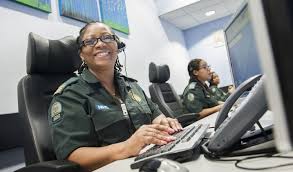Computer Training For Emergency Service Personnel: Emergency Service Personnel receive extensive training in their respective academies. In the initial phase of training, the main subject matter is academic. Law enforcement personnel, for example, discuss topics such as state law, the introduction of drugs, the introduction of hazardous substances, and more through class hours. The rest of the training cycle is direct training. In some direct training, the computer plays the main role. For example, for law enforcement there is a scenario of 'shoot or don't shoot': This is played in video games such as systems, where officers stand on a layered surface that detects every movement (crouching, kneeling, shifting sideways) to the side). While standing on the surface, the officer has a 'holstered' weapon and is given a scenario where he must decide whether to shoot the subject or not. During this training, officers of each action or lag are monitored up to and including verbal commands given to the 'subject'. This type of computer training has been vital for years in evaluating prospective law enforcement officials.
 |
| Computer Training For Emergency Service Personnel |
In the world of Emergency Services, certification is very important. Included in the definition of Emergency Services personnel are the police, fire department, and EMS. In most states, these personnel are required to maintain certification through a point system. Personnel earn points through completion of the course; annual certification in various subjects and annual recertification. In addition to points obtained for required academic subjects, there are points given for similar training courses. This 'extra' subject is often seen as an acceptable substitute for the subjects needed.
In the past fifteen years, due to budget constraints and other factors, annual academic subject matter is being rearranged to accommodate computer training. This has proven to be cost-effective for state and local agencies: the budget is unlimited, so funds are available for special projects and the like.
There are many examples of computer training received by Emergency Service Personnel. Of the many important classes, for example, is the course on the introduction of Dangerous Materials. The benefits of completing a course like this are twofold: the material can be easily covered during the shift, and instant results are produced. The fact that computer training courses can be completed during work shifts makes it effective for small departments in terms of travel costs, vehicle wear and time lost for training.
Also Read : Why Entrepreneurs Like Google Adwords
For police who want to get training on problems that usually require their presence at a remote training conference, this is a blessing. Computer training courses that cover topics such as the introduction of drugs are relatively easy to find. These courses are generally recognized by each country's law enforcement training division. While a police officer may be discouraged from taking such a course during duty hours, it is very possible to complete such a course during holiday hours. Again, this type of computer training not only benefits officers, but also the Department.
Perhaps the greatest benefit of computer training for Emergency Services Personnel is one aspect of their lives that is the most neglected: family time.





0 comments